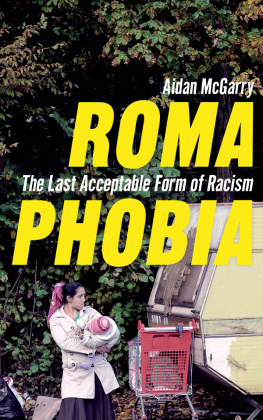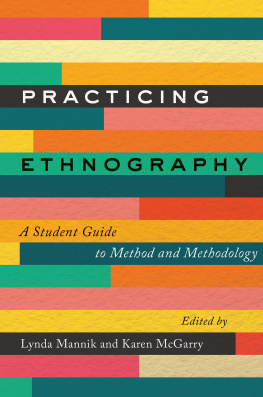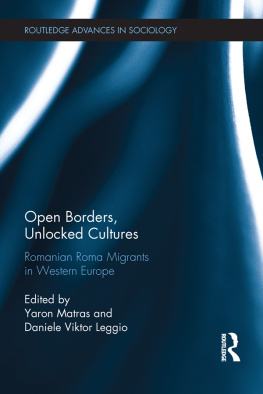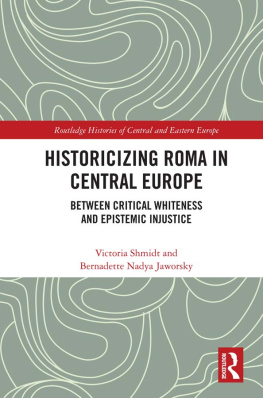
ABOUT THE AUTHOR
Dr Aidan McGarry is principal lecturer in politics at the University of Brighton.
ROMAPHOBIA
THE LAST ACCEPTABLE
FORM OF RACISM
Aidan McGarry

Zed Books
LONDON
Romaphobia: The last acceptable form of racism was first published in 2017
by Zed Books Ltd, The Foundry, 17 Oval Way, London SE11 5RR, UK
www.zedbooks.net
Copyright Aidan McGarry 2017
The right of Aidan McGarry to be identified as the author of this work have been asserted by him in accordance with the Copyright, Designs and Patents Act, 1988
Typeset in Book Antiqua by seagulls.net
Index: Ed Emery
Cover design: Clare Turner
Cover photo: Villeneuve dAscq, 2013 Philippe Huguen/AFP/Getty
All rights reserved. No part of this publication may be reproduced, stored in a retrieval system or transmitted in any form or by any means, electronic, mechanical, photocopying or otherwise, without the prior permission of Zed Books Ltd.
A catalogue record for this book is available from the British Library
ISBN 978-1-78360-400-5 hb
ISBN 978-1-78360-399-2 pb
ISBN 978-1-78360-401-2 pdf
ISBN 978-1-78360-402-9 epub
ISBN 978-1-78360-403-6 mobi
CONTENTS
ACKNOWLEDGEMENTS
It was only possible to write this book due to a research grant from the University of Brighton in 2013. I was awarded a Rising Star research grant, which allowed me to conduct research in the Czech Republic, Slovakia, Hungary and Macedonia in 2014 and 2015. It also afforded me the opportunity to hire the wonderful Dr Nick McGlynn, whose literature review of territoriality in urban geography, sociology, law and political science helped outline the key debates and focus the investigation.
I am fortunate to have friends and colleagues who read early versions of the chapters and offered invaluable critiques. I want to thank Timofey Agarin, Nicholas DeGenova, Lucie Fremlova, Nana Hkansson, Ciaran McKenna, Annabel Tremlett, Huub Van Baar, Tommaso Vitale and Can Yildiz for taking the time to share their knowledge and insights, which I gratefully took on board. Of course, any shortcomings are mine alone. Early versions of different chapters were presented at conferences and symposia at City University of New York; Uppsala University; Queens University, Belfast; Sciences Po, Paris; Al-Quds University, Jerusalem; and Comenius University, Bratislava. I am particularly grateful for the comments received from the University of Brighton Social Movement Network when I presented at the monthly seminar in October 2015.
I also want to thank the participants at a Romaphobia symposium that I organized at the University of Brighton in November 2015. Some of the debates at this symposium have found their way into this book either directly or indirectly.
My field research was greatly aided by certain individuals who helped me gain access to interviewees or resources that would have ordinarily remained out of reach. I particularly want to thank Benjamin Abtan, Mustafa Asanowski, Lili Mitrov and Violeta Vajda, each of whom was especially generous with their time and expertise. The interviews in Macedonia would not have been possible without the signposting and contacts provided by Eben Friedman, Julija Sardelic and Dejan Stepanovic. The research in Lunik IX was helped through the contacts provided by Lenka Kissov. I also want to thank the people I interviewed who shared their stories, insights, knowledge and time.
My gratitude also to Kim Walker and her team at Zed Books for editing the book and giving me the space I needed to complete it.
My special thanks go to Rowan McConnell for his unwavering support.
CHAPTER 1
ROMAPHOBIA: MARGINALIZATION AND STIGMATIZATION IN EUROPE
Today, Roma are one of the most marginalized groups in Europe, with anti-Roma attitudes on the rise. In many societies it is perfectly acceptable to denigrate Roma by invoking so-called traits and characteristics that all Roma supposedly possess. These qualities are invariably negative: Roma, as a group, are accused of criminality, deviancy, and living parasitic lifestyles. Romaphobia is the hatred or fear of those individuals perceived as being Roma, Gypsy or Traveller; it involves the negative ascription of group identity and can result in marginalization, persecution and violence. Romaphobia is a manifestation of racism: it is cut from the same cloth. Romaphobia is no different in form and content to Islamophobia or anti-Semitism, both of which are on the rise in Europe, but its causes can be particularized. There is something specific about Romaphobia, even if its racist core is familiar. I intend to explore the specifics. Instead of detailing manifestations of Romaphobia, this book uncovers the causes of racism towards Roma communities and points to constructive ways to combat Romaphobia.
While defining Roma is challenging due to the prevalence of multiple societal and political-legal representations ( social, economic and political position of Roma must grapple with the root causes of anti-Roma prejudice. Policy interventions in education, employment, housing and health are doomed to failure unless they meet the challenge of Romaphobia head on. Only by understanding the causes of Romaphobia can meaningful solutions be found. Third, the issue of responsibility is oft discussed but a common solution has found little traction. Who is responsible for the integration of Roma communities (if we agree that integration is the goal anyway)? International organizations, national governments and civil society have failed to address the most pressing socio-economic concerns of this group, and the socio-economic position of Roma has actually deteriorated in the last thirty years across Europe. So, whose fault is that? Many Roma have been unable to mobilize politically in a significant manner to articulate their needs and interests because of structural disadvantages, yet failure to improve their condition is met with accusations from the majority that Roma are helpless and hopeless. It is commonly believed that Roma do not want to integrate so should be left alone to inhabit a parallel society. However, I intend to show that Roma have never lived separate from the majority; indeed, their perceived difference has been harnessed by the state and by other actors to foster national unity, with disastrous results for Roma, who in the process have been constructed as the perennial outsider community that does not belong.
Roma have never been so high up the political agenda of national governments and the European Union, with significant media interest in Roma communities (on television and film and in books). However, despite this spike in interest, there is no clear understanding of why Roma are so vilified and so excluded in every state in which they reside. Romaphobia diverts attention from the current academic and policy trends of documenting the regrettable situation of Roma across Europe and argues that it is crucial to understand the causes of Romaphobia and not just its consequences. It challenges some of the dominant trends in academic literature on Roma and seeks to explain who Roma are. Many academics who work on Roma start by asking why Roma are the poorest, most vilified minority group in Europe, but somehow we lose our way as we evidence instances of anti-Roma prejudice and draw attention to the discrimination and persecution of Roma communities and individuals across Europe. Of course, it is imperative that we spotlight violence against Roma, the destruction of housing by authorities, the targeting and expulsion of Roma communities, ethnic profiling by the police, school segregation of Romani children, coercive sterilization of Roma women, intimidation, hate speech by elected representatives from across the political spectrum, and accusations of child abduction. However, we lack any clear comprehension of where this prejudice comes from or how it is sustained. Romaphobia therefore seeks to uncover distinct processes of exclusion and persecution by exploring the relationship between identity, territory and belonging.
Next page












